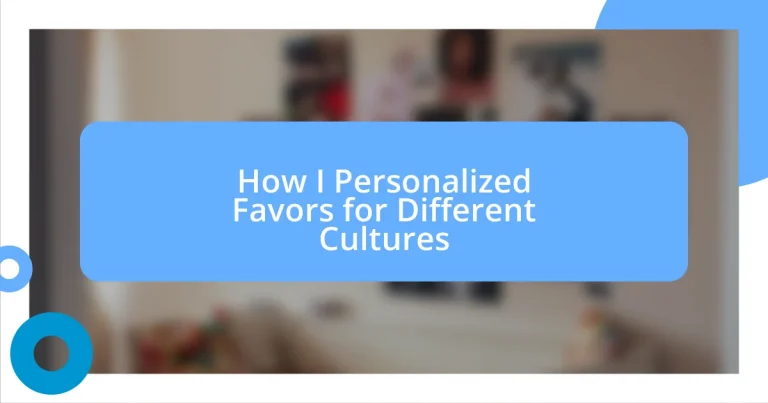Key takeaways:
- Favors have deep cultural significance, reflecting values of gratitude, prosperity, and remembrance, making them more than just gifts.
- Choosing materials and designing favors with cultural themes enhances the connection to traditions and fosters appreciation among guests.
- Gathering feedback after events allows for continuous improvement of favors, ensuring they not only resonate but also create meaningful experiences for attendees.
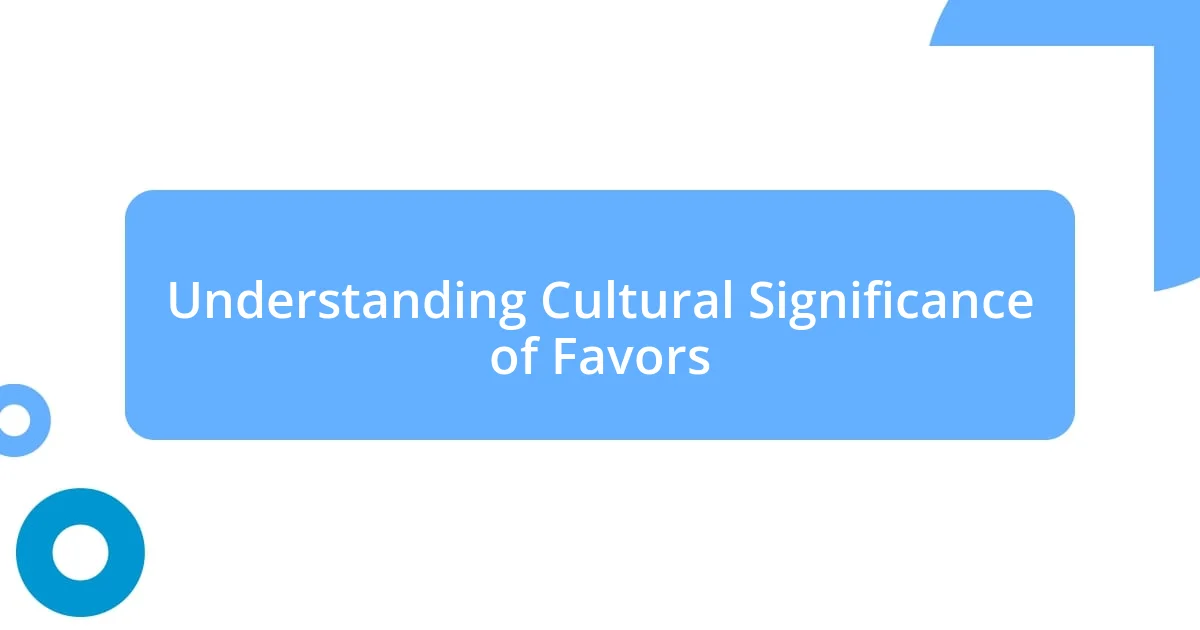
Understanding Cultural Significance of Favors
When I first began exploring the cultural significance of favors, I was struck by how deeply they can connect people. For example, during my friend’s Indian wedding, the intricately designed favor boxes, filled with sweets, weren’t just gifts – they represented gratitude and the sharing of joy with every guest. It got me thinking: how do favors convey messages of appreciation in different cultures?
In many ways, favors serve as tokens of goodwill and reflect the values of each culture. I remember attending a traditional Chinese banquet where the red envelopes filled with money represented prosperity and good fortune for the year ahead. It made me realize that these seemingly simple gestures often carry profound meanings deeply rooted in cultural customs and beliefs.
Isn’t it fascinating how a small gesture can hold such weight? For me, personalizing favors for different cultures has become a way to honor those values, like creating custom herbal tea bags for a friend’s tea ceremony, emphasizing not just the favor itself, but also the love and understanding I have for their traditions. These moments of connection make every cultural gathering feel more meaningful, bridging gaps and fostering appreciation.
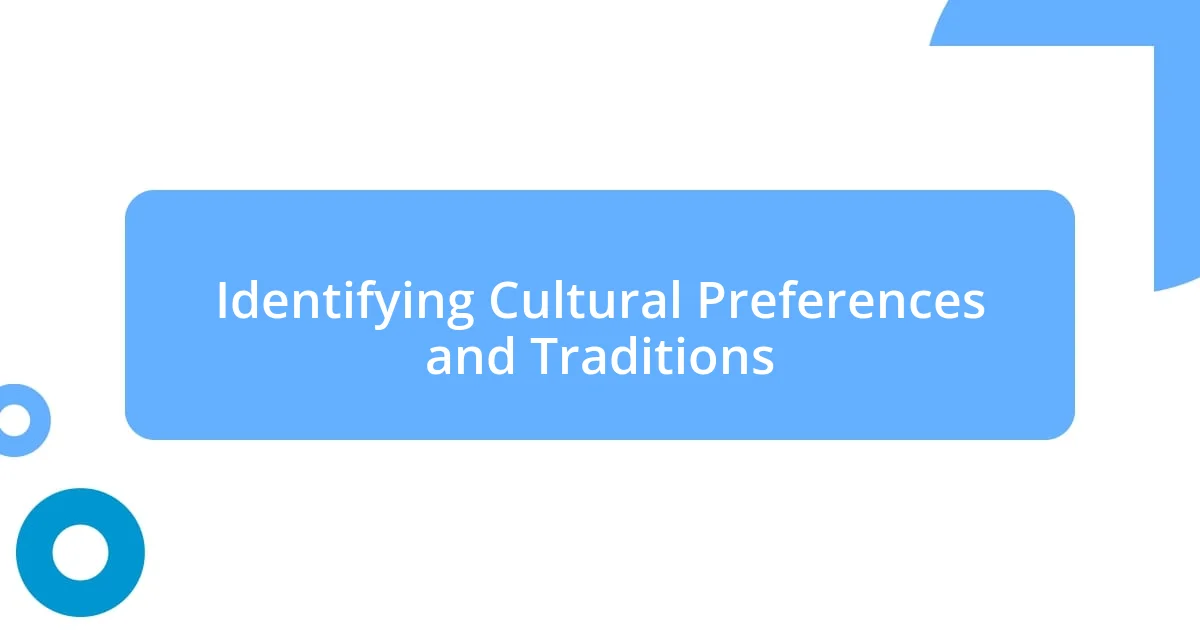
Identifying Cultural Preferences and Traditions
Identifying cultural preferences and traditions requires a keen eye and open heart. I recall a time at a vibrant Mexican fiesta, where the beautifully decorated sugar skulls were not merely sweets but a celebration of life and remembrance. This insight got me thinking about how every culture expresses its values and history through unique symbols. Understanding these nuances helps in creating favors that resonate on a deeper level, demonstrating respect and admiration for each tradition.
When I attended a traditional Greek celebration, it struck me how the small, handcrafted favors, or ‘bombonieres,’ symbolized wishes for health and happiness. Each item was meticulously chosen, and I could feel the warmth and thoughtfulness behind them. It became clear to me that identifying cultural preferences involves more than just knowing what’s popular; it’s about delving into the stories and meanings behind each tradition.
I’ve found that research paired with genuine conversations can illuminate cultural nuances. During a wedding in an Indian family, I learned that offering something handmade conveys thoughtfulness and creates a stronger connection. Listening to their stories and traditions enriched my understanding, guiding me to create personalized favors that celebrated their heritage beautifully. I believe this approach fosters not just appreciation but a true celebration of diversity.
| Cultural Preference | Significance |
|---|---|
| Indian | Intricate favor boxes symbolize gratitude and sharing joy. |
| Chinese | Red envelopes represent prosperity and good fortune. |
| Mexican | Sugar skulls celebrate life and remembrance. |
| Greek | Handcrafted favors wish health and happiness. |
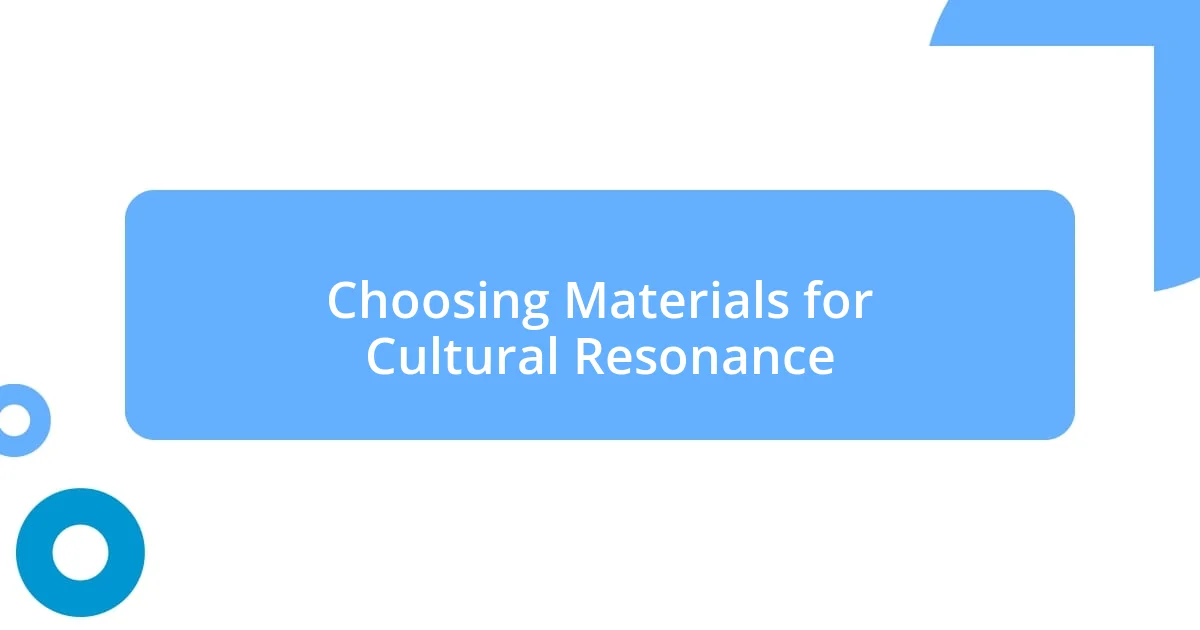
Choosing Materials for Cultural Resonance
Choosing the right materials for cultural favors is essential. I recall setting up a Hindu wedding in my neighborhood, and I decided to use natural jute bags for the favors. Jute, being eco-friendly, beautifully reflected the Indian emphasis on sustainability and respect for nature. It felt rewarding to know that these small details resonated with the couple’s values while also appealing to their guests’ broader eco-conscious sentiments. Selecting materials isn’t just about aesthetics; it’s about creating meaningful connections.
Here are some considerations when choosing materials:
- Symbolism: Opt for materials that hold specific meanings, like silk for serenity in Chinese culture.
- Sustainability: Eco-friendly materials, like bamboo or recycled paper, resonate with cultures emphasizing nature.
- Texture and Craft: Handcrafted items, like woven baskets, can evoke a sense of warmth and tradition, particularly in Latin American cultures.
When I crafted favors for a Middle Eastern celebration, using delicate ceramic dishware infused with local designs felt like honoring a rich history of artistry and hospitality. Choosing these materials wasn’t just thoughtful—it was a way to celebrate the culture’s vibrancy. It was incredible to witness how guests appreciated the effort that went into each piece, feeling that special connection to the tradition through the choice of materials.
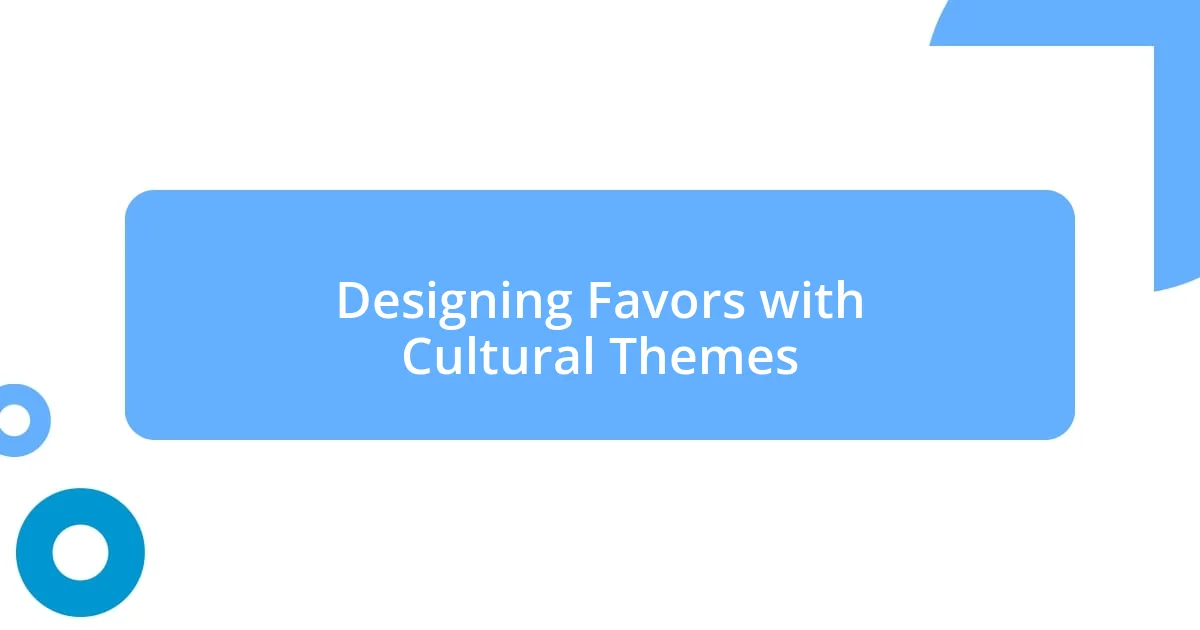
Designing Favors with Cultural Themes
Designing favors with cultural themes opens up a world of creativity and connection. I distinctly remember helping to plan a wedding for a couple with Italian roots. We incorporated small olive oil bottles as favors, representing peace and prosperity. The moment we unveiled those elegant bottles, the joy on the couple’s faces said it all—they felt understood and honored, and that made every effort worthwhile. Isn’t it amazing how a simple item can carry such profound meaning?
Engaging with local artisans is another fantastic way to weave culture into favors. When preparing for a Hawaiian luau, I collaborated with a talented lei maker who shared the significance behind each flower used in the leis. This collaboration not only infused authenticity into our favors but also educated attendees on the importance of the aloha spirit. I’ve discovered that directly connecting with artisans can deepen the experience for guests—after all, who doesn’t appreciate a story with their gift?
I firmly believe that the design process shouldn’t be rushed. During a South Asian celebration, I spent weeks working on custom boxes adorned with intricate patterns. The anticipation building up to the event was palpable, but it was worth every moment. When the guests received those favors, the sheer delight and surprise in their eyes told me that these little details made all the difference. Isn’t that the ultimate reward—to create something truly meaningful?

Incorporating Local Customs into Favors
Incorporating local customs into favors has always fascinated me; each culture has unique rituals that can significantly influence how we present our gifts. For instance, at a recent Mexican wedding, I embraced the vibrant tradition of sugar skulls from Día de los Muertos. These decorative creations brightened the tables and represented remembrance, creating an instant connection among guests. Can you imagine the joy of receiving a favor that not only looks beautiful but also carries such heartfelt significance?
I once organized a traditional Japanese tea ceremony where the favors were exquisite handcrafted matcha containers. Each container felt like a personal touch, honoring the deep-rooted significance of tea in Japanese culture. The look on everyone’s faces when they understood the thought behind it was priceless; they felt part of something truly special. Isn’t it amazing how infused cultural meanings can elevate an experience, creating shared memories that last beyond the event itself?
I also remember a charming engagement party inspired by Greek customs, where we offered small jars of honey as favors. Honey symbolizes abundance and happiness in Greek tradition, so it was a perfect fit. The guests loved learning about the significance and even started sharing their own stories related to it. Moments like these remind me that the little details make every gathering memorable and that favors can be much more than just tokens—they can be heartfelt reminders of cherished traditions.

Customizing Favors for Specific Events
When customizing favors for specific events, I always think about the story behind them. For a Moroccan-themed engagement, I chose to gift beautiful little lanterns. These weren’t just any lanterns; they were filled with fragrant spices like saffron and cardamom, adding a sensory layer to the experience. As the evening unfolded, guests would hold these lanterns, and I could see their eyes light up with delight—they were not just receiving a gift; they were taking home a piece of the vibrant atmosphere. Isn’t it incredible how a simple favor can transport you to another place?
I had the opportunity to design favors for a Viking-themed birthday party. Inspired by Norse culture, we created small wooden shields adorned with runes. Each shield represented different virtues like courage and wisdom, and I included a small card explaining these meanings. Watching the children’s faces as they received their very own shield was priceless—they felt like little warriors embarking on their own legendary journeys. It’s moments like this that make me believe that favors can spark imagination and engagement among guests, especially when they resonate with the theme of the event.
For a romantic beach wedding, I decided to offer seashells filled with hand-rolled messages—a nod to the couple’s love story. Each shell contained a note with a meaningful quote or a favorite memory, creating a personal touch that resonated deeply with each guest. As the couple read the quotes aloud, the room filled with laughter and tears; it was a beautiful reminder that every favor can encapsulate cherished moments. How fulfilling is it to know that your customization can evoke such deep emotions? That’s what makes customizing favors for specific events truly worthwhile.

Evaluating Feedback and Improving Choices
Gathering feedback after an event is crucial for me. Recently, after a multicultural wedding, I handed out a simple survey to guests, asking what they thought about the favors. The insights were illuminating—the personalized bookmarks with proverbs from various cultures were a hit! However, some guests suggested incorporating more interactive elements. Implementing that feedback in future events makes me excited about the possibilities!
I recall one instance where I chose to offer custom-made spice jars at an Indian-themed party. The feedback highlighted how much guests appreciated the integration of aroma into their experience. However, I realized I could enhance the presentation by labeling each jar with a brief story behind the spice. Now, whenever I contemplate a flavor that captures a culture, I make it a priority to include an educational angle that can deepen the connection guests feel.
Although I love the giving aspect of favors, I want them to be memorable and impactful. I often invite friends to chat about their favorites after events, and what struck me was how certain favors sparked conversations between them. Why not use that engagement to create a follow-up experience? Perhaps a small gathering where guests can share what the favors meant to them could be the perfect way to enrich not only the gift but also the relationships formed around it! Wouldn’t that add another layer of connection?












